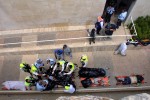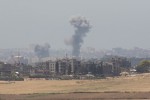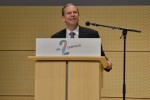A Jewish teenager with dual Israeli and American citizenship living in the southern Israeli city of Ashkelon was arrested March 23 in connection to the more than 100 bomb threats against Jewish community centres and other Jewish institutions across North America since the beginning of 2017.
The suspect, 19, was arrested by Israel’s Lahav 433 police unit in the wake of a months-long investigation by Israeli authorities, who worked alongside the FBI and other international law enforcement agencies. Authorities did not release the suspect’s name. Additionally, police detained the suspect’s father on suspicion that he knew of his son’s activities.
Authorities believe the suspect was also behind a bomb threat against two Delta Airlines flights between New York and Tel Aviv in January 2015, the Times of Israel reported.
The JCC Association of North America said on March 23 that it is “gratified by the progress in this investigation” and praised law enforcement agencies’ “commitment and leadership.” But the umbrella organization for the community centres added that it is “troubled to learn that the individual suspected of making these threats … [is] Jewish.”
During a raid on the suspect’s home, authorities found an advanced computer lab with sophisticated equipment, including voice-altering technology, encryption methods and a large antenna that he likely used to phone and email bomb threats to Jewish institutions in the United States, Canada, Australia, New Zealand and Israel.
It is believed the suspect has lived in Israel for several years, and that the Israel Defence Forces refused to draft him “on personal grounds after finding him unfit for service,” Haaretz reported.
Israel Police spokesman Mickey Rosenfeld said this arrest was part of a coordinated international operation. “This specific investigation was complex in terms of the suspect and its nature, and there was a significant breakthrough in the investigation, which led us to make the arrest of the suspect, who lives in southern Israel,” he told the Jerusalem Post.
Rosenfeld added that “he was the main suspect behind the numerous amount of threats which were made to different Jewish communities and organizations around the world.” Investigators, he said, will continue to “see if and how he was connected to the different Jewish communities in the U.S. That directs the investigation to the American connection. We are looking to see if there was an incident which triggered him to carry out threatening those communities.”
Israeli Public Security Minister Gilad Erdan congratulated police on the arrest and expressed his hope that it would bring an end to the threats against Jewish institutions.
U.S. Attorney General Jeff Sessions, meanwhile, said the Department of Justice “is committed to protecting the civil rights of all Americans, and we will not tolerate the targeting of any community in this country on the basis of their religious beliefs. I commend the FBI and Israeli National Police for their outstanding work on this case.”
Earlier this month, U.S. authorities arrested Juan Thompson, a 31-year-old former news reporter from St. Louis, in connection with eight bomb threats against Jewish institutions. At the time, law enforcement officials said Thompson was not believed to be the main suspect behind the threats, an assertion that is purportedly confirmed by the latest arrest.
Following the March 23 arrest in Israel, Anti-Defamation League chief executive officer Jonathan Greenblatt said that, even though “it appears that the main culprit behind the majority of these attacks has allegedly been identified, antisemitism in the U.S. remains a very serious concern.”
He said, “No arrests have been made in three cemetery desecrations [that occurred in early 2017] or a series of other antsemitic incidents involving swastika graffiti and hate fliers. JCCs and other institutions should not relax security measures or become less vigilant.”
– for more international Jewish news and opinion, visit JNS.org
***
Canadian reactions
“We are relieved and grateful that authorities have located the individual believed to be responsible for these false threats. At the same time, we are shocked and outraged to learn that the alleged perpetrator of these crimes, which terrorized our community, is a Jewish dual American-Israeli citizen. He appears to have acted alone, and we unequivocally condemn his behaviour.
“While Israeli authorities deserve credit for arresting this individual, he was apprehended following a lengthy and complex global investigation that included Canadian and other global law enforcement partners. We remain deeply appreciative of the work of Canadian government, police and security agencies in supporting our community.
“While these threats proved to be false, the Jewish community remains a target of hate. We encourage communal institutions to remain vigilant and follow their existing security protocols.”
– David J. Cape, Centre for Israel and Jewish Affairs
“If the allegations are true, it would prove to be shameful and disheartening.”
– Avi Benlolo, Canadian Friends of Simon Wiesenthal Centre




